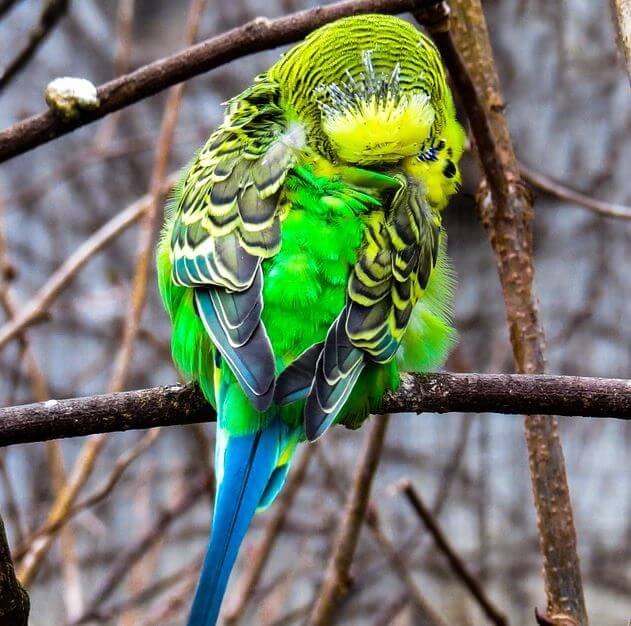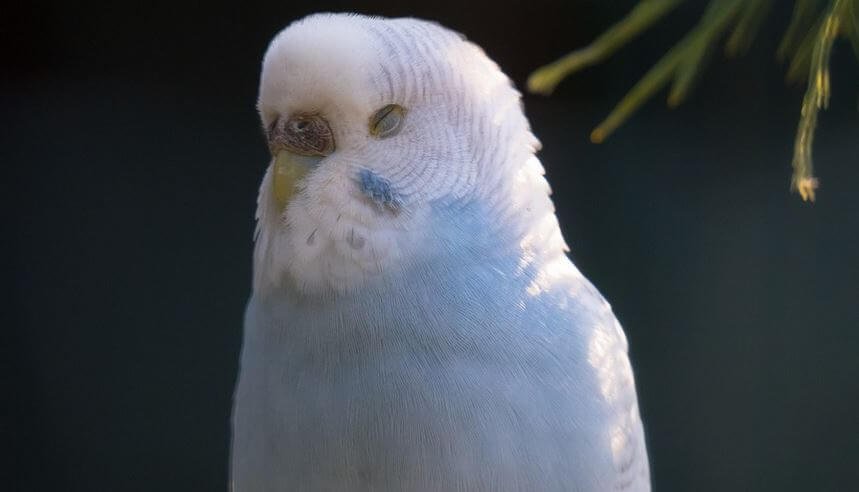When your beloved little budgie dies unexpectedly, you’re left baffled and distraught. But why do budgies die suddenly?
Budgies may die suddenly due to illness, injury, unhealthy diets, stress, dehydration, poisoning, and genetic predispositions such as inbreeding and chronic health conditions. Other causes of sudden death in budgies are old age and neglecting your birds.
Even so, you can prevent the sudden death of your budgies. By providing optimal primary care, you stand better placed to stop these causes from taking down your feathered friends.
Read on, and you’ll understand the telltale signs of a not-so-okay budgie. Plus, how to manage your budgie to avoid any unexpected deaths.
Why Do Budgies Die Suddenly? 8 Reasons

Here are eight common reasons you can trace to understand why your budgie died when you least expected it to happen.
1. Illness
While your budgie will try all means to hide an underlying sickness, it’s essential to take note of any unusual behavior.
Budgies may have a disease but hide it for self-protection from other birds in case of bullying.
Some of the diseases and conditions to look out for include:
- Obesity: Your bird gets too fat because of a seed-packed diet. It even gets worse when it doesn’t get to exercise regularly. Obese birds are prone to liver disease, a silent but sure killer.
- Egg binding: Specific to the egg-laying female birds, egg binding may soon lead to muscle weakness and paralysis – hence death.
- Bacterial diarrhea: This disease comes about due to infections of the intestines by E. coli, salmonella, clostridia, and Pasteurella pathogens. Frequent diarrhea takes a heavy toll on your budgie’s fluids. The result is dehydration and eventual death.
The diseases mentioned above are only a few of the tens that affect budgies and cause sudden death. You want to be on the lookout – and make it regular to catch up with any strange symptoms.
Find Out: What Color Should Budgie Poop Be? Tips to Identify Healthy Dropping
2. Unhealthy Diets
The last thing you want to see your budgie do is to live on an unbalanced diet. A bad diet, for instance, too many seed foods, is a precursor to an overweight budgie. Obesity may not take long before it kills your bird.
Poor diets lead to stunted growth, weakening your bird’s immune system, and malnutrition. In such a health situation, a budgie has no inherent defense against diseases and infections.
3. Stress

Like other birds, budgies undergo stress. Stress can significantly affect your budgie’s behavior and overall personality if it gets depressed.
You can know when your budgie is stressed by observing things such as:
- Extreme feather picking
- Self-mutilation
- Screaming
- Biting
The end game of a stressed budgerigar is reduced or no appetite. With a poor appetite and a lack of interest in taking water, your budgie’s immunity goes down. And that’s dangerous to its health.
Check out for extreme temperatures. They can be lethal to your budgie and a great stress trigger.
4. Airborne Toxins
Generally, budgies are fragile and sensitive to fragrances. In fact, one of the biggest culprits suspected of causing sudden deaths in budgies is aerosols that come in the form of sprays and paints.
These substances leave toxic fumes and gases in the air. Your little bird will likely breathe in these toxins and clog its fragile respiratory tract – hence unexpected death.
Look for Teflon or non-stick coating on cookware, cigarette fumes, bug sprays, pipe smoke, household disinfectants, and cleaning agents like Amazon.
Fumes emitted by these products can easily disrupt respiration in budgies. Simply put, budgies have delicate respiratory systems.
5. Toxic Foods
We’ve discussed something about poor diet being a likely cause of sudden death in budgies. By and large, some foods and treats can be toxic to budgies.
Examples are chocolate, avocado, caffeine, raw onions, uncooked beans, uncooked potato, garlic, many indoor and outdoor plants and trees, and more. Once your budgie ingests these foods, the toxicities immediately work through the system.
Also Read: Why Is My Budgie Panting? 6 Main Reasons
6. Dehydration and Starvation
Experts say a healthy budgie can take about 48 hours without food and water. Beyond that period, your budgie will die of dehydration and starvation.
If your budgie does not eat and drink well for the mentioned hours, you’ll likely lose it. Sometimes the water bottle may malfunction, so the bird cannot access water. Or the food dishes may need more food.
Obviously, your bird is dehydrated or starved. If you do not keep a close eye on your budgie and instead trust children with its welfare, it’s not uncommon to suddenly find it critically ill when all you knew was that your bird is in perfect condition.
7. Injury
If you leave your wing-clipped budgie out of the cage unsupervised, don’t be surprised when you or any other person steps on it accidentally, causing injuries. A budgie is pretty small, and such accidents are likely to occur.
How about your large dog trying to assert his territorial authority? Or your playful cat biting the budgie’s legs for a bacterial infection? Whichever the situation, injuries are prone to happen. And they’re dangerous as some can instantly end your best pet’s life.
8. Night Fright
A budgie may be awakened by sudden noises or movements in the night—it’s sensitive to either situation.
When that happens, the bird reacts with a lot of panic. It will try to escape thinking that danger is close to its home. During the panicky moments, while escaping from the perceived danger, the bird hits itself against the cage bars and ceiling.
The reaction is violent and could injure your budgie seriously, even to death. If you wake up in the morning much to the sight of a dead budgie, the chances that it was a night fright are high.
However, check whether the dead budgie has bruises and batterings on the body. If it has no physical bruises and cuts, it could have died of anything but not night fright.
Why Your Budgie Died With Eyes Open

Your budgie died with eyes open due to relaxed eye muscles that ceased to work. Typically, it indicates that the budgie has suffered from paralysis or other serious disease.
When your budgie suffers from paralysis, it’s a typical indication of a failed kidney. Such a budgie becomes weak and doesn’t have any appetite for food. This can significantly weaken its immunity. Paralysis makes nearly all parts of the body immovable.
In addition, exposure to toxins is another reason your budgie will die with its eyes open. Substances like bug sprays or hot Teflon cookware are extremely dangerous. These include chemical sprays and household cleaning agents such as bleaching chlorine.
Sudden death without a feeling of pain or suffering can make the budgie’s eyes remain open even after breathing its last. It also indicates that your budgie had possibly been in a state of relaxation with open eyes.
Can Budgies Die Of Loneliness?
Budgies can die of extreme loneliness. Usually, a lonely budgie becomes stressed and depressed, leading to loss of appetite and self-mutilating behavior like extreme feather picking.
A starving or dehydrated bird can die after a few days if it refuses food and water.
If the budgie owner is not there to interact with their bird regularly, then it’s easy to see this problem. Budgies are social birds; they love company.
That’s why avian experts would advise that you have them in pairs. They want to play with each other, chirp together, serenade, and more.
In extreme loneliness, your bird will try to do all this but in vain. Once it feels that there’s no one else around other than itself, stress sets in, and even worse, depression.
A lonely budgie may show the following symptoms:
- Loss of appetite: You may notice that the food containers have more residues. An indication that it has lost interest in the food. Lack of appetite leads to weight loss.
- Boredom: A stressed bird, due to loneliness, looks bored and stops singing altogether. It becomes sad and chooses to remain quiet rather than chirp.
- Hiding: If you notice your budgie frequently hiding in the cage corners, then there is a problem with it being lonely. However, for a budgie you recently brought home, give it time before it gets used to a life of singleness.
- Self-mutilation: Your lonely budgie could end up self-mutilating its body. It chews through its skin, exposing tissue and bones to pathogens.
How Do You Keep A Budgie Alive?
You can keep your budgie alive by providing optimal care. The cage should be cleaned regularly, food and water provided on time, and treatment done on schedule in case of illness.
Here are some tips to ensure your feathered buddy doesn’t die suddenly:
Look for Signs of Illness
Ensure that you reach out to the avian veterinarian as soon as possible for diagnosis and treatment. This should be urgent since budgies succumb quickly may to a serious disease.
Some common diseases associated with budgies are obesity, parasite infestation, egg binding, chronic egg laying, and more.
Provide a Balanced Diet
The best diet for budgies should contain 75 percent formulated pellet food and 25 percent fresh foods like vegetables and fruits. Also, provide adequate clean water.
Check for water bottles and food containers to ensure enough food and water. Clean them regularly and add more as needed.
Feeding your budgie seed-packed diet can result in obesity.
Provide Company and Exercise
If you have only one budgie in the cage, give it company. Budgies love having companions. It builds their social life while improving performance.
Place toys in the cage to encourage frequent movements and exercise. Once in a while, take him for exercise outside the cage. Doing this reduces boredom and loneliness, which can lead to bad behavior.
Ensure a Clean Environment
The cage should be cleaned regularly and thoroughly. Scrap the floor and rinse well with clean water. In addition to cleaning your budgie’s cage, providing a spacious cage allows the bird to roam freely in the space – hence exercising.
Final Thoughts
The question, “Why do budgies die suddenly” is a complex one with multiple answers.
From poor nutrition to undiagnosed illnesses, there are many factors that can contribute to the sudden death of your feathered friend.
However, you can prevent the sudden death of your budgie by providing a healthy diet, regular veterinary care, and a safe environment.


What’s the best fruit and vegetables to feed them?